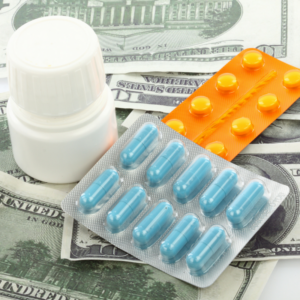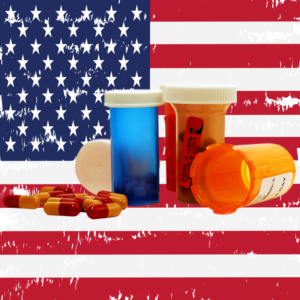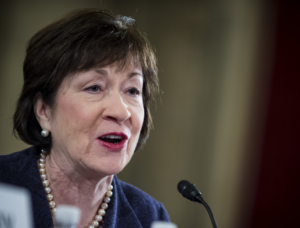by Gabriel Levitt, President, PharmacyChecker.com and Prescription Justice | Jun 1, 2018 | Drug Importation
 The relentless deluge of Big Pharma bunk in the media continues. Dr. Kristina Acri, an associate professor of economics at Colorado College, recently published an op-ed in a local Colorado newspaper – The Pueblo Chieftain – called “Drug importation bill a poison pill.” Dr. Acri is against a state bill supported by Congressman Jared Polis (D-CO), who is also running for Governor, that would allow the wholesale importation of lower-cost medication from Canada. This bill is similar to one recently passed in Vermont, which came from drug importation model legislation created by the National Academy for State Health Policy.
The relentless deluge of Big Pharma bunk in the media continues. Dr. Kristina Acri, an associate professor of economics at Colorado College, recently published an op-ed in a local Colorado newspaper – The Pueblo Chieftain – called “Drug importation bill a poison pill.” Dr. Acri is against a state bill supported by Congressman Jared Polis (D-CO), who is also running for Governor, that would allow the wholesale importation of lower-cost medication from Canada. This bill is similar to one recently passed in Vermont, which came from drug importation model legislation created by the National Academy for State Health Policy.
The Pueblo Chieftain did not include that Dr. Acri has worked for the Pharmaceutical Researchers and Manufacturers of America. She is also known as a staunch supporter of the drug industry’s intellectual property rights agenda.
Congressman Polis was given ample opportunity to respectfully refute Dr. Acri’s stance in his own op-ed called “A safe way to lower drug costs.” I liked his op-ed. Feel free to read both of their positions, but one thing he wrote about Dr. Acri’s piece was wrong: “I very much appreciate Dr. Acri offering a constructive, fact-based critique that enriches our community’s discussion of this important issue.” Her piece was decidedly not fact-based, and it needs to be called out. Let’s break it down.
First, she writes: “A study by the Organization of Economic Co-Operation and Development showed that counterfeit drugs accounted for 2.5 percent – or $461 billion— of the world drug market in 2013.” I looked at that report, and it states that in 2013 international trade in counterfeit and pirated goods (not just drugs) “represented up to 2.5% of world trade, or as much as $461 billion.” That section is referring to total world trade – not solely pharmaceuticals. That total includes all counterfeit products ranging from “high-end consumer luxury goods such as watches, perfumes or leather goods, to business-to-business products such as toys, pharmaceuticals, cosmetics and foodstuffs.” Over the years, the industry has plucked numbers out of thin are on the topic of counterfeit drugs, getting “facts” to stick in the media, but this one really took the cake.
See the study for yourself: https://read.oecd-ilibrary.org/governance/trade-in-counterfeit-and-pirated-goods_9789264252653-en#page12. (more…)
Tagged with: colorado, Congressman Jared Polis, Dr. Kristina Acri, nashp, state importation bill
by Gabriel Levitt, President, PharmacyChecker.com and Prescription Justice | May 18, 2018 | Drug Importation
 In its wisdom and activist spirit, Vermont has a new law on the books allowing for the wholesale importation of FDA-approved drugs from authorized wholesalers in Canada. Canadian wholesale pharmacies sell many brand-name drugs at much lower costs than their U.S. counterparts. This could help patients pay lower prices at local pharmacies and the state to save money on its pharmacy bills.
In its wisdom and activist spirit, Vermont has a new law on the books allowing for the wholesale importation of FDA-approved drugs from authorized wholesalers in Canada. Canadian wholesale pharmacies sell many brand-name drugs at much lower costs than their U.S. counterparts. This could help patients pay lower prices at local pharmacies and the state to save money on its pharmacy bills.
Some people (oh, I don’t know, ones sponsored by Big Pharma) are saying that the drug importation program is illegal. Let me tell you why that’s ridiculous – and I’m using a kind word. The new law does not allow pharmacies in Vermont to import medication from Canadian wholesale pharmacies; at least not yet. Instead, Vermont will ask permission from the U.S. Department of Health and Human Services to implement an importation program. It will try and prove to the department that its program will be safe and compliant with federal law. If the Secretary of Health and Human Services certifies the program, which is permissible under current law, only then will Vermont bear the fruits of its labors and begin importing from Canada.
I wrote more extensively about similar legislation introduced in Utah, which passed the House but failed to make it through the Utah Senate. Here’s that analysis: Rep. Norman Thurston’s Utah Drug Importation Bill. It explains, mostly, what this bill is and is not.
What’s amazing and motivating is that Vermont passed this bill 29-0 in the Senate, and 141-2 in the House. Vermont is not putting up with pharma’s bull on importation anymore.
Word up, Vermont!
Tagged with: Vermont
by Lucia Mueller, President, PharmacyChecker.com | May 11, 2018 | Drug Importation
 Today, President Trump will be talking about drug prices and his administration’s plan to help Americans better afford prescription drugs. By permitting importation of affordable medication, the administration has a chance to really strike a populist chord and a positive one.
Today, President Trump will be talking about drug prices and his administration’s plan to help Americans better afford prescription drugs. By permitting importation of affordable medication, the administration has a chance to really strike a populist chord and a positive one.
It’s been said that the president is going to talk about trying to force other countries, such as Canada, to raise drug prices. Instead, why not expressly allow Americans to access those lower prices through importation? It was one of the solutions offered by Trump during his campaign.
The millions of Americans, across all parties, who already import medication to fill prescriptions will wildly applaud the administration for doing so.
Can Trump use executive authority on drug prices? Yes. Under current law, the Secretary of Health and Human Services, Alex Azar, can permit individuals to import medication for personal use right now. The Secretary can also make it lawful for companies to import FDA-approved drugs at wholesale pharmacies in Canada.
America is united against high drug prices. It seems we’re only waiting for POTUS to catch up.
Tagged with: Alex Azar, executive authority, trump
by Gabriel Levitt, President, PharmacyChecker.com and Prescription Justice | Apr 12, 2018 | Drug Importation
 It’s widely known that Americans buy medications from Canada and other countries because the prices are much lower. What many people do not know is how people are doing this.
It’s widely known that Americans buy medications from Canada and other countries because the prices are much lower. What many people do not know is how people are doing this.
Even our foremost scholars on the issue of U.S. pharmaceutical prices don’t know. In an article published in the prestigious British Medical Journal (BMJ), readers are informed that:
“A modest proportion of U.S. citizens travel to Canada and Mexico to purchase lower priced prescription drugs.23”
That footnote – 23 – links to a 2016 Kaiser Family Foundation Health Survey, which includes the question:
“Have you or another family member living in your household ever bought prescription drugs from Canada or other countries outside the United States in order to pay a lower price, or not?”
Eight percent of respondents said that they had, which is about 20 million Americans, but the survey did not ask how they did it.
The data is far from perfect. I looked at several data sources when I wrote a report in 2015 called Online Pharmacies, Personal Drug Importation and Public Health. In one analysis of an FDA survey in 2012, I estimated that about six million Americans were purchasing medication from outside the U.S. over the Internet. I believe that figure is somewhat inflated. (more…)
Tagged with: Aaron Kesselheim, BMJ, CDC, Daraprim, Kaiser Family Foundation, lomustine, Ravi Gupta
by Lucia Mueller, President, PharmacyChecker.com | Apr 11, 2018 | Drug Importation
 More than 50 health professionals signed a letter addressed to President Donald Trump, members of Congress and the U.S. Food and Drug Administration (FDA) asking that we expressly permit personal prescription drug importation. The letter comes along the ever-swelling wave of patient and provider outrage against Congress’ and the president’s failure to act on drug prices, a result of the Big Pharma/U.S. politician relationship, which is only growing cozier.
More than 50 health professionals signed a letter addressed to President Donald Trump, members of Congress and the U.S. Food and Drug Administration (FDA) asking that we expressly permit personal prescription drug importation. The letter comes along the ever-swelling wave of patient and provider outrage against Congress’ and the president’s failure to act on drug prices, a result of the Big Pharma/U.S. politician relationship, which is only growing cozier.
The letter states:
“Our patients, who have purchased medications through the help of pharmacy storefronts or international online pharmacies verified by PharmacyChecker.com, have received safe and effective medications from legitimate pharmacies in Canada and several other countries. We respect that the FDA is charged with protecting our nation’s medicine supply from counterfeit and otherwise substandard drugs. However, there is no logical reason why the FDA should interfere with the delivery of safe and effective medications to our patients.”
(more…)
Tagged with: doctors, FDA, Florida, healthcare providers, pharmacychecker recommended, prescription justice
by Gabriel Levitt, President, PharmacyChecker.com and Prescription Justice | Apr 6, 2018 | Drug Importation
 Earlier this week, three U.S. senators sent a letter to the CEO of Tri-Source Pharma, LLC, inquiring about the 1400% drug price spike of cancer pill Lomustine 100mg. Tri-Source owns NextSource Biotechnology, LLC, which markets the drug. Congress wants answers! How could a drug that cost $50/pill in 2013 now cost $768/pill? The answer can be found in a 2013 press release from NextSource Biotechnology: consolidating, rebranding and launching matured and orphaned drugs.
Earlier this week, three U.S. senators sent a letter to the CEO of Tri-Source Pharma, LLC, inquiring about the 1400% drug price spike of cancer pill Lomustine 100mg. Tri-Source owns NextSource Biotechnology, LLC, which markets the drug. Congress wants answers! How could a drug that cost $50/pill in 2013 now cost $768/pill? The answer can be found in a 2013 press release from NextSource Biotechnology: consolidating, rebranding and launching matured and orphaned drugs.
Keep in mind, we’re talking about a drug that was patented in 1976 and first approved by FDA in 1982. The drug had lost its patent protection.
Authored by Senators Susan Collins (R-ME), Claire McCaskill (D-MO) and Catherine Cortez Masto (R-NV), the letter asks for sales, expenses, profits, communications, projections, etc. related to the drug Lomustine. That’s all very interesting information and you can read the letter yourself. But I wrote about Lomustine’s price history back in December to point out, among other things, that Lomustine 100mg was (and is) available in Canada and for sale online, for a discount of 97%: $25 per pill compared to $768/pill. Check it out: Lomustine 100mg prices.
At a maximum, if knowing that patients can obtain Lomustine in Canada helps them stay alive then that’s awesome.
At a minimum, this pricing information shows how utterly stupid the price is here in America.
My earlier reporting may also help the senators uncover market manipulation by the very drug companies that are involved. The FDA-approved Lomustine, which is the generic name, that is so expensive here is branded (or better said “rebranded”) as Gleostine. The Health Canada-approved Lomustine is called CeeNu. Until 2013, the lower-cost CeeNu was available in the U.S. by Bristol-Myers Squibb for $50/pill; still twice the Canadian price, but a far cry from $768.
From that 2013 press release by NextSource Biotechnology, we learn that the company’s scheme was to have exclusive distribution of a re-branded and launched drug. When Bristol-Myers Squibb decided to stop making the drug in 2012, the FDA added it to a list of drug shortages in 2013. At the time, compounding pharmacies were making the drug. Those compounded versions are not FDA-approved but are often tolerated when there are shortages. In 2014, the compounding pharmacies were sternly warned by NextSource Biotechnology that they better cut it out because, now that there was an FDA-approved version in town, those compounded versions weren’t welcome anymore and are against FDA regulations.
But, at that time, CeeNu—the exact same product sold in the U.S. until 2013—was being marketed and sold in Canada at a much lower list price by Bristol-Myers Squibb. Unlike the compounded versions, CeeNu was approved by the FDA, meaning there couldn’t possibly be safety differences between the Canadian and U.S. drug. Moreover, both CeeNu and the re-branded Gleostine were made in the exact same plant in Italy by the same manufacturing company, Corden Pharma.
The question I’m left wondering about is whether it’s illegal or not to import CeeNu from Canada. After all, it was an FDA-approved drug and it’s made in the same plant as Gleostine. A label could be attached to meet FDA requirements. There’s no prohibition against importing FDA-approved drugs, people!
Look to Canada for Lomustine.
Tagged with: lomustine, mcCaskill, Next Source Biotechnology, Susan Collins, tri-source
 The relentless deluge of Big Pharma bunk in the media continues. Dr. Kristina Acri, an associate professor of economics at Colorado College, recently published an op-ed in a local Colorado newspaper – The Pueblo Chieftain – called “Drug importation bill a poison pill.” Dr. Acri is against a state bill supported by Congressman Jared Polis (D-CO), who is also running for Governor, that would allow the wholesale importation of lower-cost medication from Canada. This bill is similar to one recently passed in Vermont, which came from drug importation model legislation created by the National Academy for State Health Policy.
The relentless deluge of Big Pharma bunk in the media continues. Dr. Kristina Acri, an associate professor of economics at Colorado College, recently published an op-ed in a local Colorado newspaper – The Pueblo Chieftain – called “Drug importation bill a poison pill.” Dr. Acri is against a state bill supported by Congressman Jared Polis (D-CO), who is also running for Governor, that would allow the wholesale importation of lower-cost medication from Canada. This bill is similar to one recently passed in Vermont, which came from drug importation model legislation created by the National Academy for State Health Policy.

 In its wisdom and activist spirit, Vermont has a
In its wisdom and activist spirit, Vermont has a 



